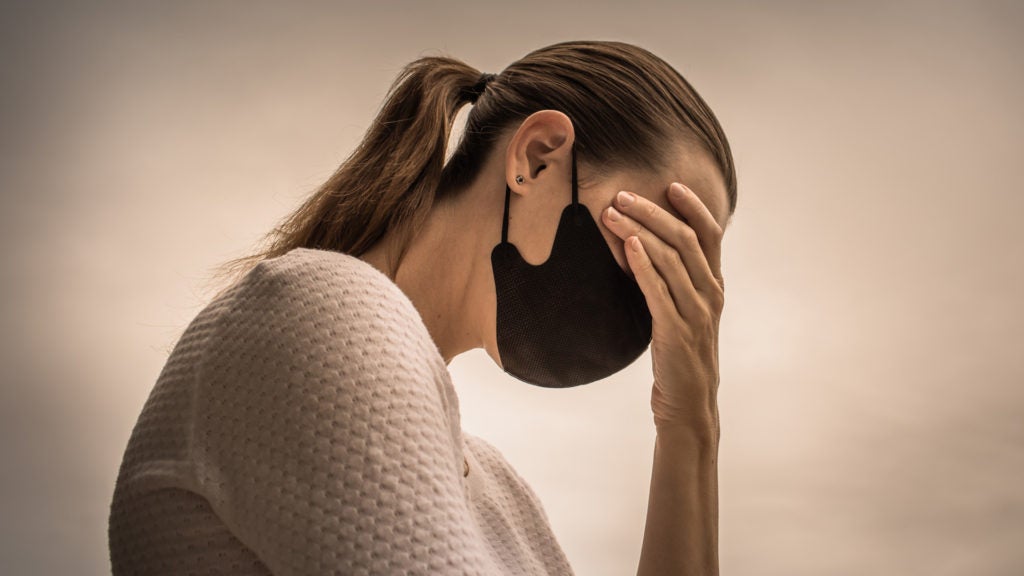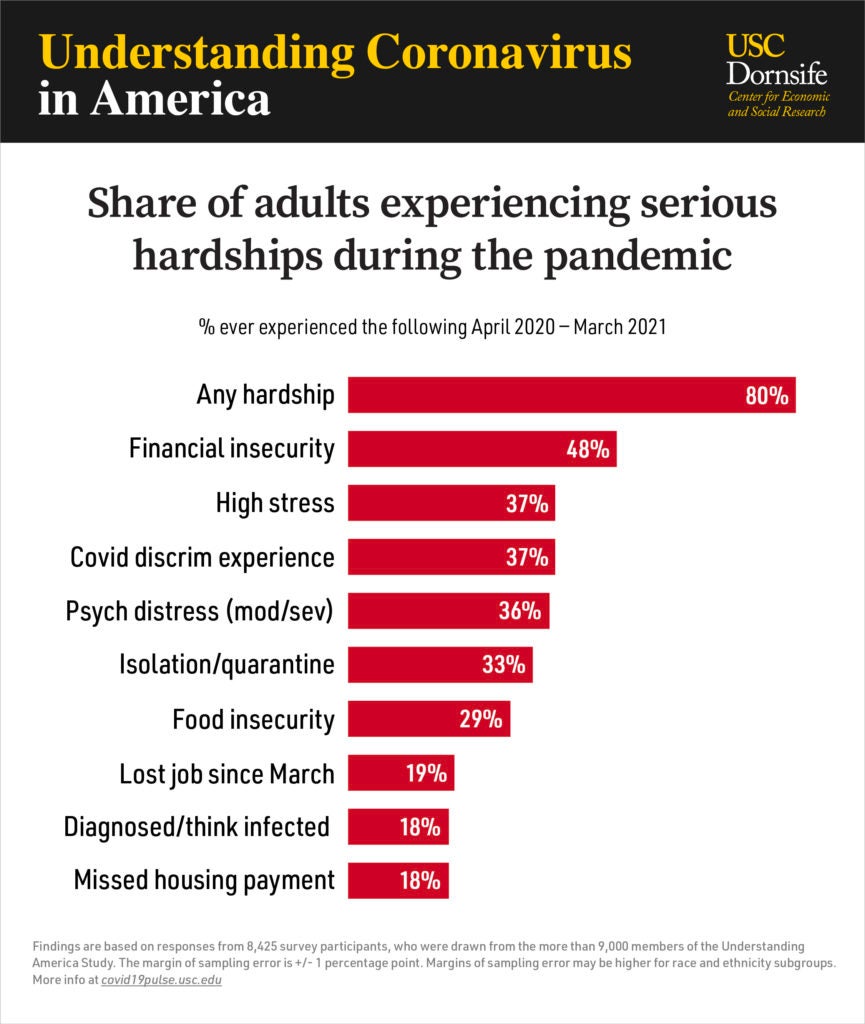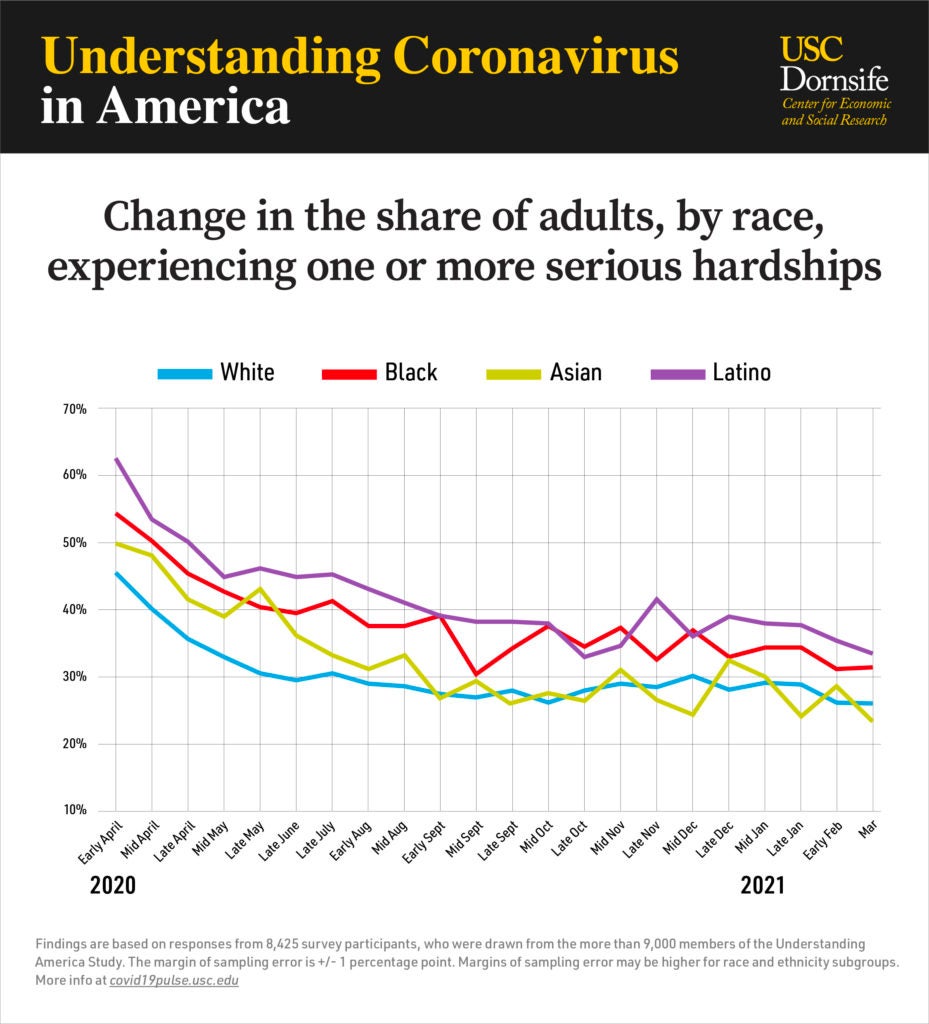
USC Dornsife’s Understanding Coronavirus in America Study reveals Latinos, Blacks were most likely to experience a serious hardship during the pandemic and that the prevalence of serious hardships has dropped significantly since April 2020.
Contact: Jim Key, (619) 253-1077 or jameskey@usc.edu or Jenesse Miller, (213) 810-8554 or jenessem@usc.edu
To measure the serious hardships people have experienced over the course of the pandemic and the distribution of those experiences across the population of U.S. adults, the USC Dornsife Center for Economic and Social Research developed the Pandemic Misery Index, drawing on data from the Understanding Coronavirus in America Study, the only nationally representative survey continuously fielded since the start of the pandemic.
The index includes nine measures of serious hardship: financial insecurity, food insecurity, moderate/severe psychological distress, symptoms of high stress, job loss since March 2020, COVID-based discrimination, a missed housing payment, being placed in isolation or quarantine, and a COVID diagnosis or perceived COVID infection.
Download report and read definitions for each hardship here.
â— Prevalence of serious hardships during the pandemic
From high stress to food insecurity to losing a job, 8 in 10 U.S. residents experienced at least one serious economic, psychological or health-related hardship since April 2020.
â— Most common serious hardships
Almost half of U.S. adults (48%) reported financial insecurity at some point since April 2020, with 29% experiencing food insecurity and 18% missing one or more rent or mortgage payments. More than one-third reported symptoms of high stress (37%), moderate to severe psychological distress (36%), and/or at least one experience of COVID-based discrimination (37%). One-third (33%) reported being placed in isolation or quarantine.
â— Changing experiences of hardships, over time
In April 2020, as the U.S. economy stumbled and unemployment reached double digits, 50% of U.S. residents reported experiencing some kind of serious economic, psychological or health-related hardship. Since then, the prevalence of these hardships has declined 22 percentage points to 28% in late March 2021.
â— Distribution of serious hardships by race/ethnicity
The burden of COVID-related hardship falls unequally across the U.S. population. Almost 9 in 10 Latinos (89%) have faced at least one serious hardship during the pandemic, compared to 86% of Black people, 80% of Asians, and 76% of white people. While the percentage of people experiencing a serious hardship has declined for all races/ethnicities, the share of Latino and Black people facing hardships remains much higher.
“Despite unprecedented economic stimulus and direct financial support to individuals and families, hardships related to the pandemic persist. As recently as the end of March, more than 2-in-10 U.S. adults experienced financial insecurity, 7% were food insecure and 6% missed a house payment.”
— Jill Darling, Survey Director, USC Dornsife Center for Economic and Social Research
“In many cases, the burden of pandemic misery is falling disproportionately on communities of color.
— Kyla Thomas, Sociologist, USC Dornsife Center for Economic and Social Research
About the Understanding Coronavirus in America Study
The data was collected from participants in the Understanding America Study (UAS), which is a nationally representative, probability-based online panel of adults who regularly answer tracking survey questions.
Findings in this release are based on responses from 8,425 participants, who were drawn from the more than 9,000 members of the UAS. Participants responded between April 1, 2020, and March 30, 2021. The margin of sampling error is plus or minus 1 percentage point. Margins of sampling error may be higher for race and ethnicity subgroups and are available in the survey’s topline and crosstab reports at covid19pulse.usc.edu.
Image via iStock






